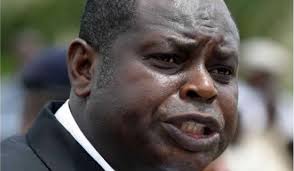What killed Diepreye Alamieyeseigha eight days ago? The main culprit is high blood pressure with its cousin diabetes. Complications of the disease must have led to kidney (renal) failure and then cardiac arrest.
It’s not true he developed HBP on hearing that he could be extradited to the UK; he had been living with, and managing, diabetes and its cousin. Anyone who has met Alams knows that he was overweight – his stomach alone competed with three bags of cement.
While commiserating with the family and friends of DSP Alams, I wish to share some health tips I have learned through association with health workers for several decades now. I’ve done so before, in this space. Perhaps someone else with HBP and diabetes would be able to live longer than Alams did: 63 years.
Whether sick or not, those near age 40 and older are advised to do comprehensive checks at least once a year. Often, it is poverty that keeps many away from doctors and hospitals in a country that has no health insurance scheme. For one to complete the normal tests, one needs upwards of N60, 000. And the likelihood of discovering one or two diseases after the tests is always high. Next is the treatment. Many fail to go for check-ups and possible treatment unless they are very sick. The poor are always afraid! However, the “governor-general” of the Niger Delta, a man who was governor of Bayelsa State for six years, couldn’t have lacked money to treat himself.
Many of us are often guilty of neglecting our own health. We take our cars to the mechanics at the first sign of trouble. We invite plumbers to fix our bathrooms. When the TV set, computer or generator malfunctions, we always seek the relevant technicians. But when it concerns our health – our life that is irreplaceable and upon which everything else (including the cars and computers) depends – we refuse to pay attention. No irony could be greater.
At times, we tend to seek diagnoses of our ailments in unorthodox ways. Some choose faith healing. Even orthodox healers recognise faith healing and herbal medicine: Our ancestors depended on these from prehistoric times. But Africans have allowed much of this knowledge to perish. The in-thing is to study Pharmacy in the university without acquiring any knowledge of the roots and leaves of African plants. Many of the great medicine men of old died without passing the knowledge of herbs to their offspring. Today, 419 healers have taken over, prescribing loads of cash to be delivered to them rather than medicines to be taken by their patients. The Asians have not been foolish like us Africans.
I’m not preaching against orthodox medicine. Any good doctor would tell you that every drug has a side-effect. You would have noticed that many doctors – those that prescribe basketfuls of tablets, capsules and injections to be taken thrice a day after meals – hardly take the drugs themselves. If your doctor doesn’t take drugs, why receive them from him?
Truly, some have met their own death by taking fake or substandard drugs. Many cases have been misdiagnosed in Nigeria, leading to untimely deaths. Everyone, for instance, seems able to identify malaria. Though it’s prevalent in Nigeria due to mosquito attacks, many have shortened their own life by wrong diagnosis and wrong treatment. It shares symptoms with some killer diseases, and, by the time the patient rules out malaria as the problem, the damage to vital organs could have been done. Stress, for instance, makes one weak and sleepy just like malaria. Rather than take a bed rest, the ignorant one may ingest drugs that are injurious to their health. Usually, the next suspect after malaria is typhoid fever. The number of positive cases recorded in widal tests has eroded the credibility of many labs. But, since clean water is a luxury here and many foods hardly pass the hygiene test, people do not bother to seek a second opinion.
Along with malaria, stress could be the harbinger of the silent killer called hypertension. I’m not a doctor but even doctors don’t know the actual causes of many diseases. HBP, they say, has genetic sources but they have also not discarded tension or worry that lay people often attribute it to. Physicians agree that “environmental factors” play a role. There’s hardly any Nigerian today that can successfully ward off anxiety in everyday life. Unpaid school fees, unpaid rents, unaffordable hospital bills, lack of jobs, lack of food, lack of security, lack of spouse, loss of loved ones, political tensions, uncertainty about the future – who can avoid these stressors?
Many Nigerians in their 40s have high blood sugar levels that indicate the presence of diabetes. Doctors implicate the pancreas’ inability to do its job, but consumption of sugar has been named as a culprit, as has lack of exercise. Sportsmen, farmers, labourers and others who do strenuous tasks – who sweat profusely on the farms and on the fields – are unwittingly taking great medicine. Despite the presence of numerous regulatory agencies, most foods we eat and offer guests are little less than processed sugar: the beers, the malt and soft drinks, the snacks. I wonder why these firms have not been put out of business by low demand for their products. Nigerians have to be saved from themselves. And one sure way is by making harmful products very expensive. Tobacco, brewery and certain so-called beverage companies ought to be taxed heavily.
Good health depends a lot on the things we eat. Physicians advise us to eat everything in moderation. Bad cholesterol in fried/processed foods is linked to obesity, HBP, stroke and heart failure. We Africans ought to be eating fresh foods – including vegetables and fruit, not processed or canned ones. Sweet things kill.
#











